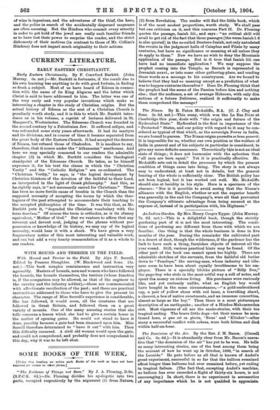[Under this handing we notice *wit Books of the week
as hays not been toserved for review in other forms.] (2) from Revelation. The reader will find the little book, which is of the most modest proportions, worth study. We shall pass but one criticism on it, and this concerns Part II. Dr. Fleming quotes the passage, Isaiah liii., and says : "no critical skill will avail to get rid of the fact that these passages [the verse Isaiah L 6 is also quoted] in the so-called Deutero-Isaiah, not only antedated the events in the judgment halls of Caiaphas and Pilate by many centuries, but have no significance or meaning at all unless they do apply to them." Now we have no wish to deny the Messianic application of the passage. But is it true that Isaiah liii. can have had no immediate application ? We may suppose the prophet coming into the Temple, as Baruch is represented in Jeremiah xxxvi., or into some other gathering-place, and reading these words as a message to his countrymen. Are we bound to believe that they had no meaning except as a prediction of what was to happen centuries thereafter ? Does Dr. Fleming think that the prophet had the scene of the Passion before him and nothing else ; that the audience, a set of average Hebrews, with only dim notions of a future Deliverer, realised it sufficiently to make them comprehend the message?










































 Previous page
Previous page